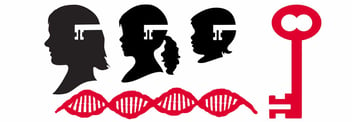Your Ultimate Brain Health Gene Chart
- Home
- Blog

DNA+Environment+Triggers+Chance = Good Health or Ill-Health
Decipher and Decode Your Personal Genome, to Prevent Stress, Heart Disease, Dementia and Chronic Illness– Bruce Alan Kehr, M.D.
Mental Health Genes
Dear Reader… Last week, I offered you a chart describing some of the key genes that you and your doctor can utilize to apply precise pharmaceutical solutions to target the treatment of depression, anxiety, bipolar disorder and ADHD based upon analyzing your personal genome. In other words: a deep understanding of last week’s chart can save you and your doctor weeks or months of trial-and-error in your search for a prescription medication that works right for you. Based upon the Genecept Assay genetic test, your personal DNA analysis offers you information that can help you feel better within a shortened period of time. This is known as Precision Medicine.
Physical Health Genes that Affect Your Mental Health – Actionable DNA Testing
This week, I offer you a chart with genes that affect both your physical and mental health, whose negative effects you can target without any medication at all—genes whose expression can be altered to reduce your risks of developing chronic illness, reduce the negative health effects of preexisting chronic diseases, and increase your overall resilience. These epigenetic interventions can improve your overall health and wellness over a period of months and years with the right habits, from exercise to supplements to mindful eating habits and more. This chart is based on the Mindful DNA Assay offered by Genomind—and the genes analyzed within this test will give you an in-depth understanding of your own body’s vulnerabilities, as well as the power you hold within you to take action and change your genetic outcomes for a brighter and healthier future.
The genes in this chart are divided up into the six systems or domains in which they operate. We can “nurture” the expression of these genes in each of these systems by avoiding or practicing certain lifestyle choices, regardless of which genes we’ve inherited. Let’s take a look at the chart for more targeted lifestyle adjustments we can take to improve how our genes affect our health, one by one!
DOMAIN: COGNITION AND MENTAL ACUITY
The genes in your Cognition and Mental Acuity system are primarily responsible for healthy brain functioning. They can have an impact on our moods and mental clarity, as well as determining the rate of our eventual cognitive decline.
TREM2
A rare variant on the TREM2 gene can lead to a heightened risk of developing Alzheimer’s Disease. This gene encodes for a vital receptor—located on the surface of your brain’s microglial cells—that fights inflammation, helps metabolize debris from cells that have died, and destroys dangerous proteins that build up in the brain. The failure of this receptor to function normally—a side effect of a TREM2 mutation—is now understood as a core component of Alzheimer’s progression. Take a genetic test to find out if you have a risk TREM2 variant and you could add years to your brain’s healthspan.
Possible Gene Modifications
- Lithium
- Vitamin D
APOE
If you possess a certain allele of APOE known as APOE4, you may be significantly more likely to develop Amyloid β plaques—the plaques that contribute to the development of Alzheimer’s Disease. As with TREM 2, a genetic test to determine if you carry a risk APOE gene may help you stave off Alzheimer’s.
Possible Gene Modifications
- Manage Hypertension
- Mediterranean Diet
- Vitamin D
- Melatonin
- DHA/Omega 3
- Carotenoids
ABCA7
If you possess a G allele variant on your ABCA7 gene, you have an estimated 17-20% greater likelihood of developing Alzheimer’s. This gene is involved in coding for processes that clear Amyloid β proteins and dead cell debris from our brains to prevent the damaging effects of their accumulation.
Possible Gene Modifications
- Mediterranean Diet
- Vitamin D
- Melatonin
- Olive Oil Polyphenols
- Carotenoids
- Curcumin
CD33
Variants of this gene determine a receptor on the microglial cells that is responsible for an “on-off” switch in the cells. If “turned on”, the cells clear out amyloid and other bad debris. If “turned off”, it can lead to oxidative stress and damaged neurons. Make sure you are protecting your brain by taking a genetic test. Once you understand what genetic variants you’ve inherited, you can begin to aim for better health and wellbeing.
Possible Gene Modifications
- Mediterranean Diet
- Vitamin D
- Melatonin
- Carotenoids
- Curcumin
DOMAIN: CARDIOMETABOLIC
Genes within your cardiometabolic system can significantly influence everything from your waist circumference to your blood pressure and cholesterol levels—and identifying your personal genome within this system can help predict future negative health outcomes, including heart disease, high blood pressure and Alzheimer’s. “What’s good for the heart is good for the brain,” and as it turns out, keeping your heart healthy may well keep your brain healthy too. By shifting your gene expression towards resilience, you can achieve a healthier cardiometabolic system.
CRP
CRP, or “C Reactive Protein”, is produced in response to inflammation and tissue damage and is a predictor of cardiovascular disease risk. A high level of CRP has been associated with a doubled risk of a coronary event—and certain variants on this gene may leave you predisposed to these higher levels of heart attack risk. Specifically, if you have CT or TT genotypes, you may have a significantly greater risk for elevated CRP. If you have a risk CRP genetic variant, you can fight back against developing heart disease by following the recommended lifestyle habits.
Possible Gene Modifications
Test for additional biomarkers for cardiovascular disease
CHRNA5/A3
CHRNA5 and CHRNA3 both encode a receptor that nicotine binds to in order for your body to process its physiological effects. Variants on this gene can either reduce or increase this receptor’s function—specifically, the A allele has been associated with an increased risk for nicotine dependence. Knowing what variant you possess on your CHRNA5 and CHRNA3 genes can help you pinpoint the right treatment options for quitting your nicotine addiction… and that’s what precision medicine is all about!
Possible Gene Modifications
- Nicotine Replacement Therapy
- Smoking Cessation Pharmacotherapy
PCSK9
This gene expresses an enzyme that is strongly linked to lipoprotein (cholesterol) homeostasis—and certain variants lead to greater metabolism or clearance of cholesterol and LDL particles (bad cholesterol) in the blood. If you were born with a gene that leaves you with a slower LDL metabolism process, you may be at a higher risk for all the heart problems associated with high levels of bad cholesterol. The more you know about your genes, the more you can protect against these negative heart health outcomes, and protect your brain, too.
Possible Gene Modifications
- Screen for Lipid Disorders
- Mediterranean Diet
- Berberine
DOMAIN: INFLAMMATION
Chronic Inflammation could well be called a “civil war within your body.” When there is damage inside your body and brain, your glial cells—your body’s very own army of soldiers used to fight infection and clear out dangerous cellular debris—immediately respond by sweeping the affected environment for toxic substances to destroy. In order to maintain the energy for this all-out war, they feed off the sugar and ketones needed to produce energy for other cells, like neurons. When the war is short and sweet, inflammation is a necessary and vital immune system process in your body. But chronic inflammation can leave your body more vulnerable to developing numerous chronic diseases such as cancer, chronic fatigue, dementia, depression, anxiety, bipolar disorder, arthritis gut problems and more. Virtually every cell in the body is negatively affected by the chronic inflammatory process. Stop chronic inflammation in its tracks!
IL6
Short for “Interleukin 6”, this gene helps stimulate the immune responses in your body. Interestingly, it seems to play a role in both reducing inflammation and inflaming it in the first place. However, one variant on this gene—C174C—has been implicated in a wide range of inflammation-related diseases, including dementia, arthritis, and fatigue. If you have a risk allele on this gene, you might want to mitigate its effects and work to epigenetically shift your risk through lifestyle factors.
Possible Gene Modifications
- DHA
- Probiotics for Periodontitis
MTHFR
You may remember the MTHFR gene from our prior series, where we described it as the “manufacturing gene” for its role in building the neurotransmitter supply chain that keeps you emotionally healthy. If you have a risk variant on this gene, your MTHFR gene is less able to efficiently convert folic acid into methylfolate—crucial for synthesizing those mood regulating neurotransmitters. Inflammation reduces the manufacture of these critical neurotransmitters and can instead cause “bad genes” to express themselves to bring about depression, anxiety, and bipolar disorder that are resistant to treatment. By taking a DNA test you can better understand the status of your MTHFR gene and whether your brain needs help in producing the vital methylfolate that keeps it running smoothly. The right supplements can augment standard medications to help ensure a greater recovery from a mood or anxiety disorder.
Possible Gene Modifications
L-methylfolate supplementation
DOMAIN: STRESS AND EMOTIONAL WELLBEING
The genes within your Stress and Emotional Wellbeing domain dictate how your body responds to stress and how resilient you are when a stressful life situation strikes. These genes may predispose you to react in more extreme ways towards outside stressors than you may otherwise if you had a different personal genome, and are responsible for everything from headaches to fatigue, lower sex drive, sleep problems, irritability, and persisting sadness. If you suffer from chronic stress, it may not just be your external circumstances. It may be your genetic vulnerabilities as well. Understanding the genes in this domain can help you defeat the stress that keeps knocking you down.
FKBP5
If you have a T allele on your FKBP5 gene, you may be predisposed to higher levels of stress. This variant confers a dysregulated cortisol response to stress, fails to “turn off” your stress response, decreases your ability to “come down” after a stress response, and has even been shown to possibly increase the risk of depression following trauma. In other words, if you have this variant, you very likely have an atypical and heightened response to stress. Lifestyle changes and supplements can help you regulate and decrease your response to stress over time.
Possible Gene Modifications
- Meditation
- St. John’s Wort
- Phosphatidyl Serine
- N-Acetylcysteine (NAC)
- Vitamin D
- Neurofeedback with QEEG
- Ashwagandha
- Agmatine
- Exercise
CRHR1
If you have a G allele on your CRHR1 gene, you may prone to significantly increased levels of cortisol in response to stress, as well as poor working memory and increased rates of depression. If you have an A allele, you are likely more resilient to stress. Take control to decrease your high levels of stress response by better understanding the genes working behind the scenes, and remember: when it comes to stressful situations, you only have so much conscious control. Your genes play a larger role than you may know.
Possible Gene Modifications
- Meditation
- Phosphatidyl Serine
- N-Acetylcysteine (NAC)
- Vitamin D
- Neurofeedback with QEEG
- Ashwagandha
- Agmatine
- Exercise
BDNF
In our “DNA… I Am Who I Am… or Am I?” series, I described BDNF as the “rainforest gene” for the major role it plays in neurogenesis and synaptic plasticity in our brain—the process that allows our neurons to grow, adapt, and connect to one another. One variation of this gene known as the Val66Met polymorphism is associated with reduced BDNF, which means reduced neuroplasticity—which has a surprising negative impact on our resilience to stress. There’s good news, however: simple lifestyle changes like exercise can play a big role in increasing your levels of BDNF, moving you from a “risk” gene to something more positive.
Possible Gene Modifications
- Daily exercise
- Microdose Lithium
- Green Tea
- Phosphatidyl Serine
- L-theanine
- Exercise
DOMAIN: GASTROINTESTINAL AND IMMUNE
Your “gut”, or your microbiome health , plays a surprisingly important role in your body’s overall health and wellness—and science is beginning to show it plays an even more profound role in your mental health as well. This is known as “the gut-brain axis.” And “dysbiosis” – poor health in your microbiome – can bring about many negative health effects. Excitingly, we are on the precipice of understanding exactly how the microbiome affects every organ and system in our body. But what we do know today is that the genes within this system can impact your metabolism, dictate your food sensitivities, and even determine whether or not—or to what extent—you may suffer from gastrointestinal issues.
FUT2
This gene affects the surface receptors that allow for the attachment and growth of intestinal microbiota (the trillions of healthy or unhealthy bacteria and viruses in your gut) and provides an important food source for healthy gut bacteria. If you have a resilient FUT2 gene, your surface receptors are robust and you have more potential for a diverse—and thus healthy—microbiome. If you have a risk gene, however, you likely have a lower diversity and possible dysregulation of gut microbiota. Those with the risk variant have a 7-14% increased risk of inflammatory GI conditions like Celiac disease or Crohn’s disease. The sooner you take a genetic test, the sooner you’ll be able to understand if it’s your genes that are making you feel less than optimal – you just don’t feel well—and then, find solutions to help change that outcome.
Possible Gene Modifications
- Probiotics
- Prebiotics
- Sodium Butyrate
- Palmitoylethanolamide (PEA – in egg yolks)
HLA-DQ2/HLA-DQ8
Simply put, these genes are the ones that put you at increased risk of suffering from Celiac disease. The DQ2 and DQ8 haplotypes (genes inherited from a single parent) are strongly associated with the disease, and the DQ5 haplotype is carried in 90-95% of all Celiac patients. This disease can impact your entire body, from your energy levels to your brain functions—and the sooner you know whether you suffer from a gluten sensitivity, the sooner you can make those gluten-free changes to your diet to feel better.
Possible Gene Modifications
- Screen for Celiac Disease and Gluten Sensitivity
- Gluten-free diet
MC4R
Studies have shown that if you carry a T-C variant on your MC4R gene, you may have a 30% increased chance of being obese, in addition to having a higher risk of metabolic syndrome (insulin resistance, high blood pressure, high cholesterol), which can be a precursor to type 2 diabetes. This gene moderates the effects of leptin, a neuro-hormone that regulates satiety (“feeling full” when eating), metabolism, and energy balance. For those with a risk variant, increased food consumption is likely caused from the body’s decreased ability to feel sated (“full”). This risk, however, can be moderated. Knowledge of the risk is the first step in knowing how to manage the outcomes.
Possible Gene Modifications
- Exercise
- Calorie Restriction
- Mediterranean Diet
- Screen for Metabolic Syndrome/Type 2 Diabetes
- Ketogenic Diet
DOMAIN: SLEEP
Numerous studies have shown the vital importance of a good night’s sleep to maintain the health and well-being of every cell in your body—and the genes dictating your sleep patterns thus play an outsize role in your overall wellbeing. A chronic lack of sleep has been associated with memory problems, immune system dysfunction, difficulty concentrating, and even Alzheimer’s Disease. Bottom line? Sleep is about so much more than “feeling rested” or “refreshed”. Getting enough sleep can in fact add years to your healthspan—and not getting enough can take years away. Pay attention to the genes within this system and you will feel better for years to come.
CLOCK
As its name suggests, CLOCK is one of the central genes involved in governing and regulating your biological clock, or your circadian rhythms. Specifically, CLOCK regulates that circadian activity across a number of biological functions, including metabolism and energy balance. If you possess a risk variant of this gene, your circadian rhythms may be slightly dysregulated, leading to a less functional metabolism and other related consequences—like obesity, diabetes, and metabolic syndrome. Interestingly, this gene has also been associated with emotional eating. By taking a genetic test, you will gain a greater understanding into both your sleeping and eating habits and how to modify them.
Possible Gene Modifications
- Screen for Metabolic Syndrome and Type 2 Diabetes
- Mediterranean Diet
- Bright Light Therapy
MEIS1
If you were born with a T-G variant on your MEIS1 gene, you may have an increased risk of developing Restless Legs Syndrome (RLS)—and those born with a G allele have an almost twofold increase in developing RLS over time. If you have this risk gene, you and your doctor can discuss options to help evaluate whether you have this condition, and if so, mitigate its effects, which often keep individuals up at night due to a strong urge to move.
Possible Gene Modifications
- Sleep Study if Suspect Restless Legs Syndrome (RLS)
- If RLS Screen for Ferritin Levels and if low Consider Ferrous Sulfate + Vitamin D
HLA-DQB1
A single variant of this gene—namely the HLA-DQB1*0602 allele—is carried in over 90% of individuals with narcolepsy – a condition characterized by excessive daytime sleepiness. Sometimes, it’s just that simple: a single gene can have an outsize impact. Narcolepsy is frequently misdiagnosed as depression, schizophrenia, or hypothyroidism. By understanding your genetic code better, you and your doctor can pinpoint the right solutions for you and your health.
Possible Gene Modifications
Screen for Narcolepsy with Epworth Sleepiness Scale (ESS)


